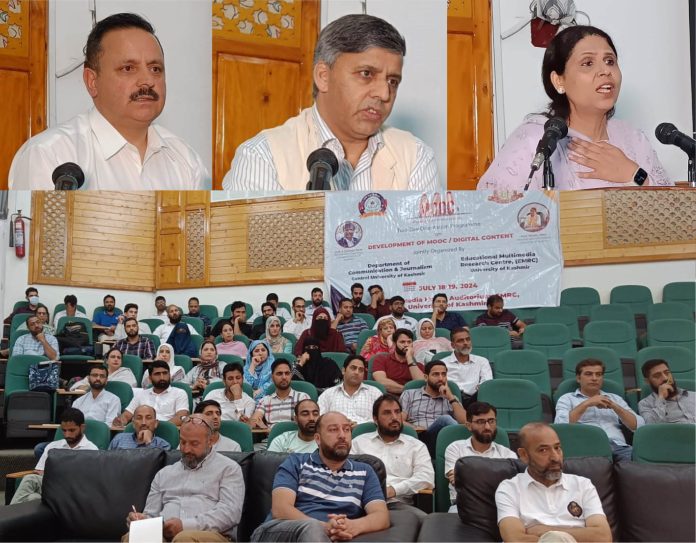KU organises 2-day orientation programme on digital content development
SRINAGAR: To enhance the digital pedagogical skills of the university faculty members and encouraging a culture of innovation in education, the Educational Multimedia Research Centre (EMRC), University of Kashmir (KU), in collaboration with the Department of Communication and Journalism (DCJ), Central University of Kashmir (CUK), Thursday inaugurated a two-day orientation programme here.
Titled, ‘Orientation Programme on the Development of Massive Open Online Courses/Digital Content’, the programme focuses on the development of Massive Open Online Courses (MOOCs) and digital content for the faculty of Central University of Kashmir.
Nearly 70 faculty members from CUK are attending the programme that will be equipped with the necessary skills and knowledge to develop and deliver effective digital content, ultimately enhancing the quality of education provided to students.
In her message, KU Vice-Chancellor, Prof Nilofer Khan said while the essence of education lies in the human connection between teacher and student, integrating technology-based learning is essential.
“We must harness the power of digital tools to enhance pedagogical practices, making education more accessible, flexible and effective,” she reiterated.
KU Registrar, Prof Naseer Iqbal, emphasised the importance of integrating digital content in higher education to meet the evolving needs of students.
“Nothing can replace traditional teaching, however, as educators and academicians, we have to encourage people and promote technology-based learning at all academic levels to stay relevant in today’s rapidly-changing dynamics of education system,” he said.
Dean, Academic Affairs, CUK, Prof Shahid Rasool, highlighted the pivotal role of digital and open learning in democratising education like the online and blended modes of teaching-learning.
“The role of a teacher is constantly changing and is becoming more challenging as today’s teacher has to deal with the ‘digital natives’. However, COVID was a game-changer in introducing technology into education that gave our teacher a wider reach,” he said adding that technology allows flexibility of time and convenience in academic pursuits.
Director, EMRC, Dr Salima Jan, outlined the genesis of platforms like SWAYAM and noted the objectives of such learning modes and models.
“We are living in a world where knowledge is no longer confined to the pages of textbooks but rather accessible at the tap of a screen,” she said adding that it is the teachers who strengthen communities by enabling them to navigate the ever-involving landscape of digital platforms and embrace emerging technologies.
Producer at EMRC and Coordinator of the programme, Ajaz-ul-Haque, discussed the practical aspects of MOOC development, sharing insights on content creation, engagement strategies and the technological tools necessary for effective online teaching.
“We all have a thread in common and that thread is technology. As teachers we sing our respective songs, but under a common music in the background that is technology,” he said adding that with technology we raise the slogan of change and “before we embrace the change, we need to understand it first”.
Dr Tariq Abdullah, Producer at EMRC, proposed the formal vote of thanks while as, Mohammad Faheem Ul Islam, Academic Coordinator, DTH (SPANDAN), EMRC, conducted the proceedings of the inaugural function.


